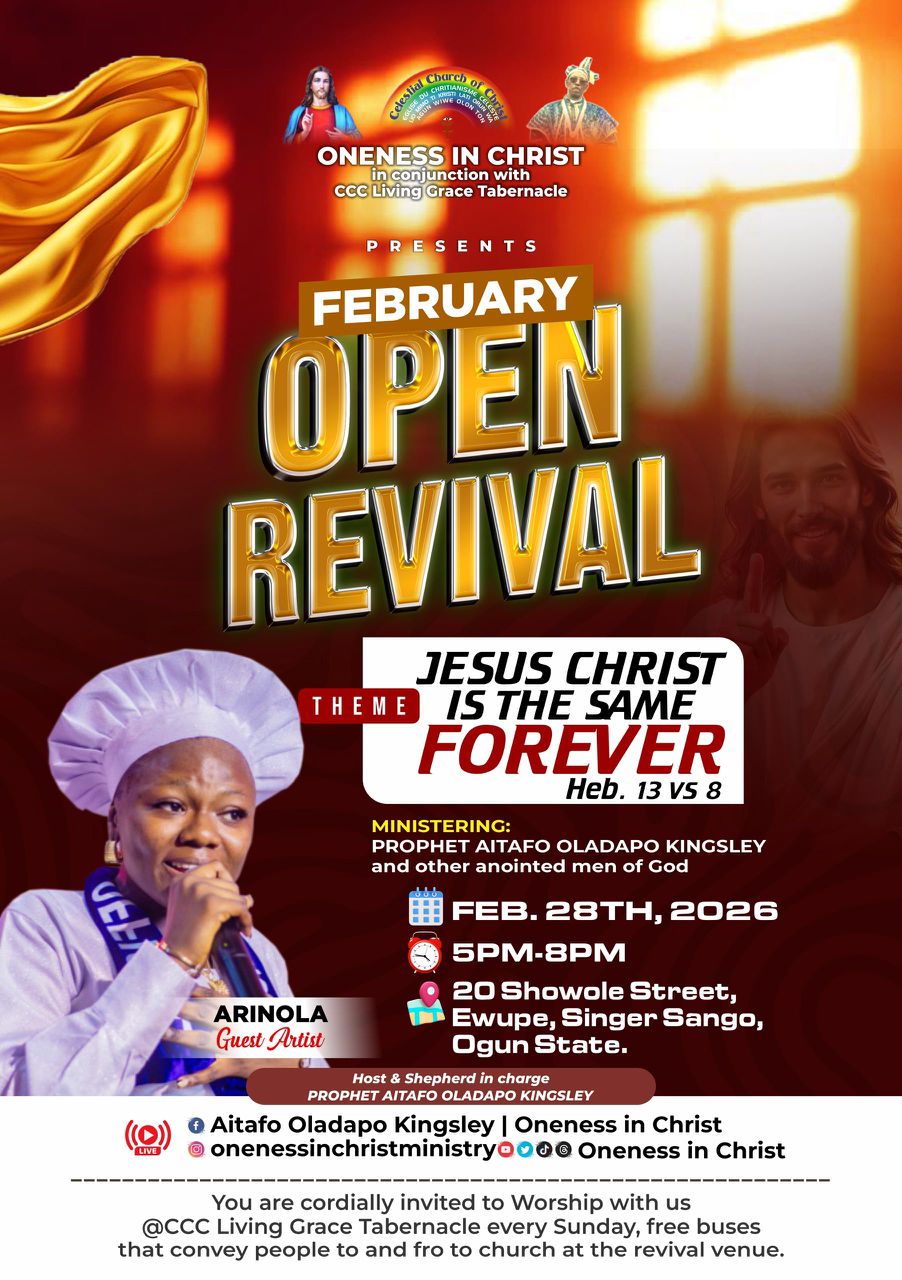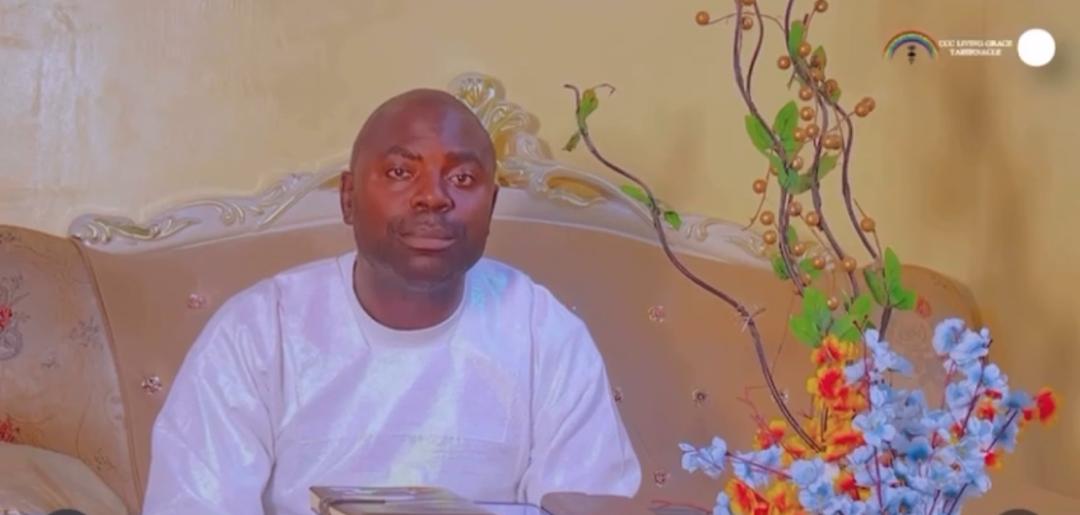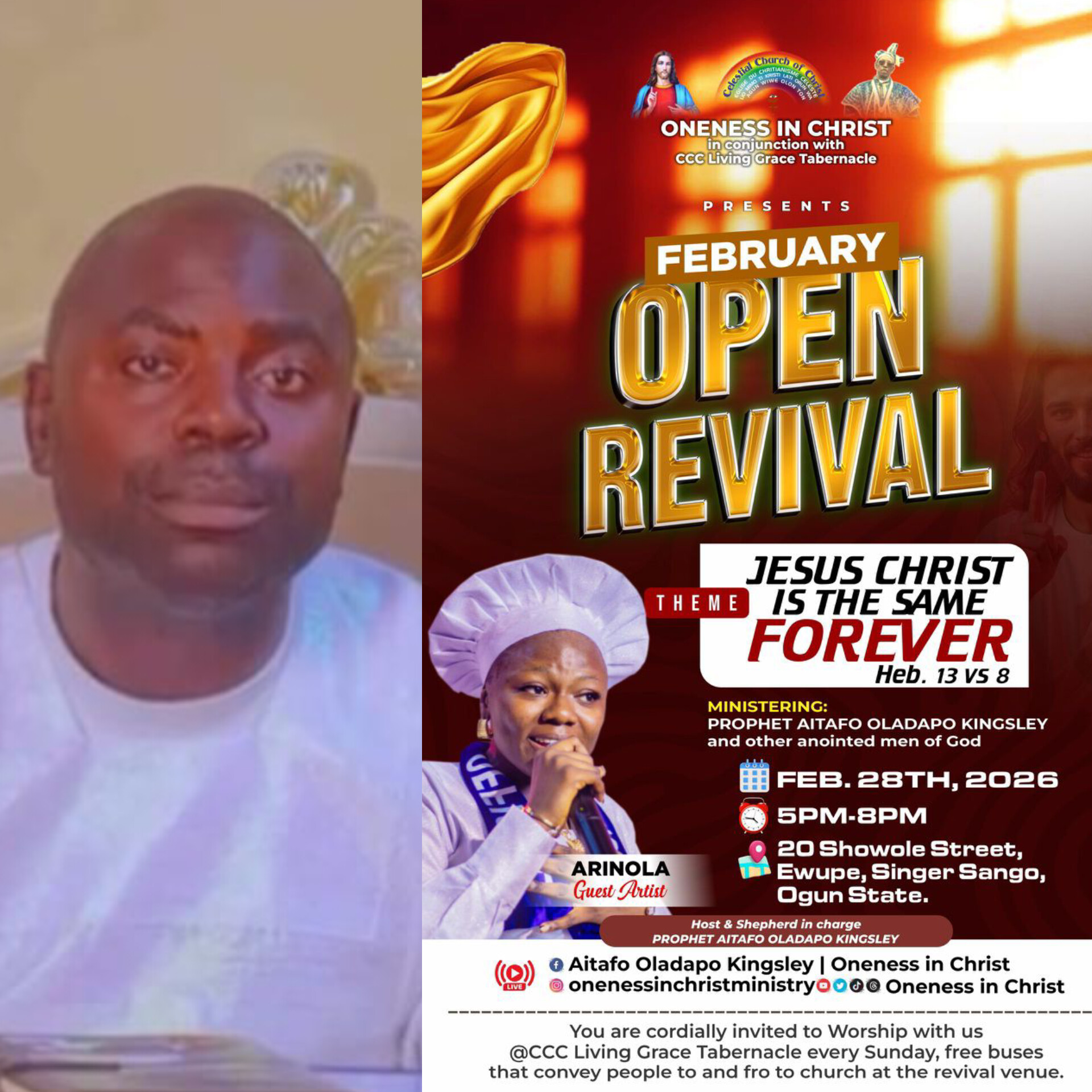news
Help Restore Hope In Our Youths, Bejeroku of Oke Agbo Urges Realtor Adeyemo

Help Restore Hope In Our Youths, Bejeroku of Oke Agbo Urges Realtor Adeyemo
…As Monarch Partner Pelican Valley CEO To Drive Development
Sahara Weekly Reports That The Bejeroku of Oke Agbo, Ijebu Igbo,Oba, Stephen Adeleke Adekoya, has described realtor Babatunde Adeyemo as a beacon of hope and charged him to use his vision, impressive achievements and experience in real estate business to restore hope in Nigerian youths.
Oba Adebajo who noted that hope is what keeps life going, said that at this critical time of the nation’s economic trajectory, hope is an essential ingredient needed to stay on right course and navigate safely.
The monarch gave the advice during an interview with The Daily Crucible at The Podium within the cosy Pelican Valley Estate Laderin, shortly after a guided tour of it by Dr. Adeyemo, the Chief Executive Officer (CEO) of Pelican Valley Nigeria Limited, a foremost real estate firm.
Oba Adebajo and one of the illustrious sons of Ijebu Igbo were at Pelican Valley to deliberate on feasible practical partnership with the CEO on community development and youth mentorship.
He expressed satisfaction with all the experiences and knowledge shared during the tour and voiced out his readiness to partner with the Pelican Valley to bring development to his domains.
The monarch said, “Anytime you see me in this element, that I’m truly and genuinely happy, I’m always turned on when I see people doing something differently and achieving uncommon result. I think such has been an experience with Pelican Valley in the last three hours we have been moving round some of your estates around in the capital city of Ogun State.
As a young man, I respect his vision and I thank God on his behalf and I’m happy again to still be a Nigerian and happy too to still be a Black man because a number of times we write ourselves off by our statements, by our actions, by our beliefs system that oh nothing good again can come from us. So, when we see things like this from young people, we are not just Blacks but who are Nigerians, you know that there is still hope for Nigeria. Like I have mentioned before, Hope is why all of us live. We all live for hope. And when there is no hope, human beings become desperate. When there is hope and continuous loss of hope, the initial thing that will set in is depression. A number of the cases that we treat in this country today that lead to fatalities are as a result of depression and also as a result of loss of hope. When the road seemed closed, fear is immediately created. When that fear that was created is not addressed on time, and there seem to be blockages as to the way out of the problem, one runs into depression. The rest can be left to the imagination. So, I have come, I have seen and my mission when I was coming was different. It was just to come, discuss with one big man in a big and cosy office and why I say he should be a mentor and add mentorship to the vocation he is presently doing, is to encourage our youth. Whatever it is that I have come for, we can do everything here with what I have seen and in my seeing, I have learnt and I have gained a lot from Pelican. And I want to appeal to the CEO and I’m praying too, that God will continue to support him. And I want him to keep the flag flying and share his vision with a number of our youths. When you do that, you create hope. Hope is the foundation of everything we become in life. It is that thing that makes you say, ‘oh I can do it?’ So, if I do it, there is an opportunity here?’
It encourages a lot of people, it gives them a renewed hope that will turn their lives for the better.
On How youths can key into the Pelican vision
Seeing is believing. A number of times, especially based on the experiences they have had, people now believe only what they can see. So, he could go to an institution, it could be one – off programme in a year, you look at all our institutions within Abeokuta and Ogun State, you pick the town Planners, architects, engineer and take them round, you let them know it is an engagement and opportunity to ask questions, to let them see how you did it and how you started, what gave you the vision, how you developed the vision and how you had the opportunity of taking easy money to start ,which would have become a challenge probably intractable challenge and how you avoided it through advice by somebody whom you can also regard as a financial mentor now. So, when you take them through such a life experience that is practicable, the end result of which they are seeing here and you bring people to this type of environment and they see it and say, ‘so things like this could happen here by vision of somebody,’ it gives them a lot of hope. The hope is what we should bring back to our youths in Nigeria.
Partnering Pelican to drive development in Ijebu Igbo
I’m already partnering with him in my mind and I don’t do anything outside of my mind. I’m telling you from the bottom of my heart that I’m already partnering with him because I have gained. When I mentioned knowledge gap which I believe is the missing gap either at the government level, individual level or at the institutional level. Yes, we have vast land that is there and my own take off point is, ‘how do we develop it?’ I started the discussion with my brother and I told him that all our children abroad and diaspora, can’t we create an estate that we can name Diaspora Estate or something befitting? Or Ijebu Diaspora Estate? He now said, ‘Yes, I have a friend, lets go meet that my friend, he is into things like what you have in mind. So, I think I have come, I have seen and I believe I will be able to conquer all the challenges facing me as far as development of this vision and my domain is concerned. If I have seen him do it, he has done it, I have seen it and he has told me so many things that assisted me in allaying some of the fears, very simple statements he might not have known or imagined the effect. He has told me that I could approach the government and of course, I will not do it without him. So, every step of the way, we will carry him along and that is deemed practical partnership. We will carry him along, we will share his experience, he will guide us, he will mentor us and I want to assure him that we will not disappoint him because we will also do well.
Speaking on the visit of the Royal father, the CEO, Pelican Valley Nigeria Limited, Amb (Dr) Babatunde Adeyemo, who expressed pleasure over the visit, described the traditional ruler as an extremely good listener and one of the most cerebral traditional ruler he had ever met. The recently inducted anti-corruption ambassador and ECOWAS youth ambassador also stated that the king had said his mind in totality and might not really need to add much. “Kabiyesi his one of the most cerebral and good listener I had met in recent times, you see, I don’t often tell people about my life stories and how integrity, goodwill, creativity and fiscal discipline can squeeze water out of the rocks, because I often sound like a motivational speaker, so nowadays days, I feel the best way to inspire is to let the people see for them selves and judge. I don’t really like motivational speakers, realtors or politicians who don’t speak with direct references or tangible evidences,talk is always cheap. Show us what you have done and use them as reference points. That is why we don’t do aggressive marketing, adverts or sales promotion at Pellican-Valley, We speak to clients through continuous value adding and developmental projects in our various Estates “.
news
Journalists for Good Governance Shines Searchlight on Local Government Administration

Journalists for Good Governance Shines Searchlight on Local Government Administration
…Calls for Accountability in Nigeria’s Grassroots Governance
LAGOS, Nigeria — A civil society coalition known as Journalists for Good Governance(JGG) has intensified public debate on transparency and accountability within Nigeria’s local government system, urging media professionals, civil society actors, and citizens to hold grassroots leaders accountable.
Speaking an event in Lagos recently, the acting chairman of the society, Comrade Bunmi Obarotimi said that despite reforms such as the Supreme Court’s 2024 ruling granting financial autonomy to all 774 Local Government Areas (LGAs), systemic challenges continues to hinder effective service delivery and responsible stewardship of public funds.
“Local governments are the closest tier of government to the people — yet too often they remain the least transparent. Without civic oversight and vibrant media, promises of autonomy ring hollow.” the acting chairman said.
The Journalist for Good Governance emphasised crucial roles that journalists can play in uncovering discrepancies in council spending, flagging poor service delivery, and educating citizens on their rights. Their call comes amid wider efforts by media and civic organisations to bridge accountability gaps. The civil society initiatives had previously launched monitoring campaigns to track local government expenditures and have been quietly advocating for transparency in how public money is deployed.
The leaders of the Journalists for Good Governance (JGG) highlighted the importance of physical assessment and citizens engagement on projects to boost people’s confidence, urging local councils to adopt open data platforms and proactive information dissemination in compliance with the Freedom of Information Act. Experts say the majority of LGAs currently lack operational websites or digital portals, further limiting public scrutiny.
The Journalists for Good Governance initiative aligns with sustained advocacy by civil society groups and governance experts calling for a collective approach to strengthening democratic accountability, and has decided to engage in critical and holistic assessments of how Local Governments is being run and the impact and quality of projects they embark-on and to address deficits in transparency and public trust.
Meanwhile, some state governments have signalled support for improved community engagement. In Lagos State, authorities reiterated a commitment to enhancing community media platforms as vehicles for civic participation and accountability at the grassroots level.
The renewed spotlight on local government administration has reignited public debate over fiscal responsibility and priorities. Controversies such as the widely criticised Adamawa council chairmen’s wives trip to Istanbul — which drew public outrage for perceived misuse of public funds — underscore why watchdog groups say stronger oversight mechanisms are urgently needed at the grassroots.
Citizens and activists have welcomed the journalists’ initiative, calling for sustained media engagement that goes beyond headlines to influence policy and accountability reform.
The civic rights advocates note that real change will require robust legal frameworks, a free press, and empowered communities equipped to demand transparency at every level of governance.
As Journalists for Good Governance mobilises its members, the coming months are likely to see heightened media attention on grassroots administration — from council budgets and service delivery to the enforcement of public information laws and digital transparency initiatives.
news
ANOTHER PROPHECY FULFILLMENT BY PROPHET KINGSLEY AITAFO OVER THE EXIT OF DR. KENOLY, ANNOUNCING FEBRUARY’S OPEN PROPHETIC REVIVAL

ANOTHER PROPHECY FULFILLMENT BY PROPHET KINGSLEY AITAFO OVER THE EXIT OF DR. KENOLY, ANNOUNCING FEBRUARY’S OPEN PROPHETIC REVIVAL
– Another Prophecy Fulfillment by Prophet Kingsley Aitafo Following the Passing of Ron Kenoly Ahead of February Open Prophetic Revival
– Prophet Kingsley Aitafo Records Another Prophecy Fulfillment as February Open Prophetic Revival Is Announced
In the released prophecies for 2026, renowned Nigerian cleric, Prophet Kingsley Aitafo, shared a series of revelations touching on Nigeria’s economy, global events, political transitions, natural disasters, religious transformations, and the future of world leaders.
During a special prophetic session, the prophet stated that he foresaw the departure of two world-renowned musicians in 2026 and urged the Nigerian people and the global community to pray for them.
He urged Nigerians and everyone around the globe to pray for the musicians, among other prophecies, and already gave insight concerning them.
On February 3, 2026, American gospel singer, songwriter, and worship leader Ron Kenoly passed away at the age of 81. Widely known as the “Professor of Praise,” Kenoly was celebrated for anthems such as “Majesty” and “Lift Him Up,” which have significantly influenced modern congregational worship around the world.
He was recognized as a pioneer of the contemporary praise and worship movement, leading Scripture-based worship services that became widely adopted in churches across different nations and cultures.
The development has been described by followers of Prophet Kingsley Aitafo as a confirmation of the prophecy earlier declared in the year.
Meanwhile, Prophet Kingsley Aitafo, leader and shepherd in charge of Oneness in Christ, in conjunction with CCC Living Grace Tabernacle, invites everyone to its February Open Revival. It is a prophetic service determined to change lives through miracles, healings, signs, and wonders.
It is not an ordinary service; it is another time for a divine encounter where your faith is strengthened, prayers are answered, and breakthroughs and favour are about to rain. With its theme — Jesus Christ is the same forever — the revival is promised to release the power of Jesus Christ like never before. It is a period of shift and divine encounter.
This revival service is said to hold on the 25th of February, 2026, from 5pm – 8pm at 20, Showole Street, Ewupe, Singer Sango, Ogun State.
It is a season where God is ready to reveal Himself like never before. Members of the public are invited to attend.
news
GEN CHRISTOPHER GWABIN MUSA SUPPORT INITIATIVE COMMENDS STATE-FEDERAL COLLABORATION IN ZAMFARA

GEN CHRISTOPHER GWABIN MUSA SUPPORT INITIATIVE COMMENDS STATE-FEDERAL COLLABORATION IN ZAMFARA
The Gen Christopher Gwabin Musa Support Initiative (GCGMSI) has commended the Zamfara State Government for its decisive contribution to security operations through the donation of newly acquired armoured personnel carriers (APCs), surveillance drones, and other critical operational equipment to troops and security agencies in the state.
This commendation was contained in a statement signed by the Convener of the GCGMSI, Ibrahim Dahiru Danfulani, Sadaukin Garkuwan Keffi/Betara Biu, and made available to the press.
The equipment was formally commissioned on Wednesday, February 18, by the Grand Patron of the GCGMSI and Minister of Defence, General Christopher Gwabin Musa, OFR (rtd.), in a ceremony at the Government House, Gusau. The event was attended by senior military officers, heads of security agencies, and top officials of the Zamfara State Government.
The GCGMSI, in its statement, hailed the donation as a “transformative and timely intervention” that aligns perfectly with its core objective of advocating for and supporting tangible measures that enhance the operational capacity and welfare of Nigeria’s security forces. The Initiative praised Governor Dauda Lawal’s administration for moving beyond rhetoric to actionable, material support, describing the move as a “blueprint for state-level collaboration in national security.”
“The provision of these assets by the Zamfara State Government is a testament to visionary leadership and a profound commitment to the peace and stability of its people,” the GCGMSI statement read. “It represents the exact kind of synergistic partnership between state and federal authorities that the GCGMSI champions. This initiative will significantly close operational gaps, boost the confidence of our gallant troops, and send a strong message to criminal elements.”
Speaking at the commissioning, General Musa emphasized that sustained collaboration is indispensable in confronting the nation’s evolving security challenges. He specifically commended Governor Lawal for his proactive support.
“Governor Dauda Lawal has demonstrated exemplary leadership and an unwavering dedication to the security of Zamfara State,” the Defence Minister stated. “The provision of these armoured vehicles, surveillance drones, and other operational equipment will undoubtedly boost the morale and operational effectiveness of our troops and other security agencies on the ground. This is a commendable effort that should be emulated by others.”
The newly commissioned assets, which include multiple APCs and advanced surveillance drones, are expected to dramatically enhance the mobility, protection, intelligence-gathering, and rapid response capabilities of security forces, particularly in the state’s remote and difficult terrains where anti-banditry operations are ongoing.
In his remarks, Governor Lawal reiterated his administration’s steadfast commitment to being a reliable partner in the security architecture. He urged security agencies to deploy the new resources responsibly and effectively to safeguard lives and property.
The Federal Government, through the Ministry of Defence, reaffirmed its commitment to continuing and deepening such partnerships with state governments across the nation to strengthen coordination and resource allocation in the collective fight against insecurity.
The GCGMSI concluded its statement by urging other state governments to take a cue from Zamfara’s “bold and pragmatic” approach, affirming that such concrete support is vital for achieving lasting peace and security across Nigeria.
-

 celebrity radar - gossips6 months ago
celebrity radar - gossips6 months agoWhy Babangida’s Hilltop Home Became Nigeria’s Political “Mecca”
-

 society6 months ago
society6 months agoPower is a Loan, Not a Possession: The Sacred Duty of Planting People
-

 society5 months ago
society5 months agoReligion: Africa’s Oldest Weapon of Enslavement and the Forgotten Truth
-

 news6 months ago
news6 months agoTHE APPOINTMENT OF WASIU AYINDE BY THE FEDERAL GOVERNMENT AS AN AMBASSADOR SOUNDS EMBARRASSING




